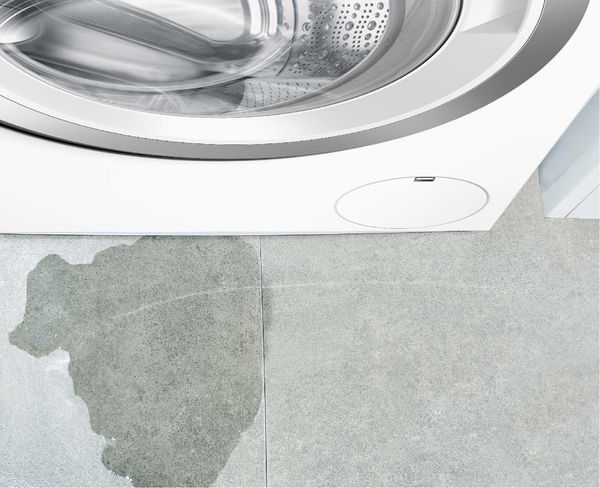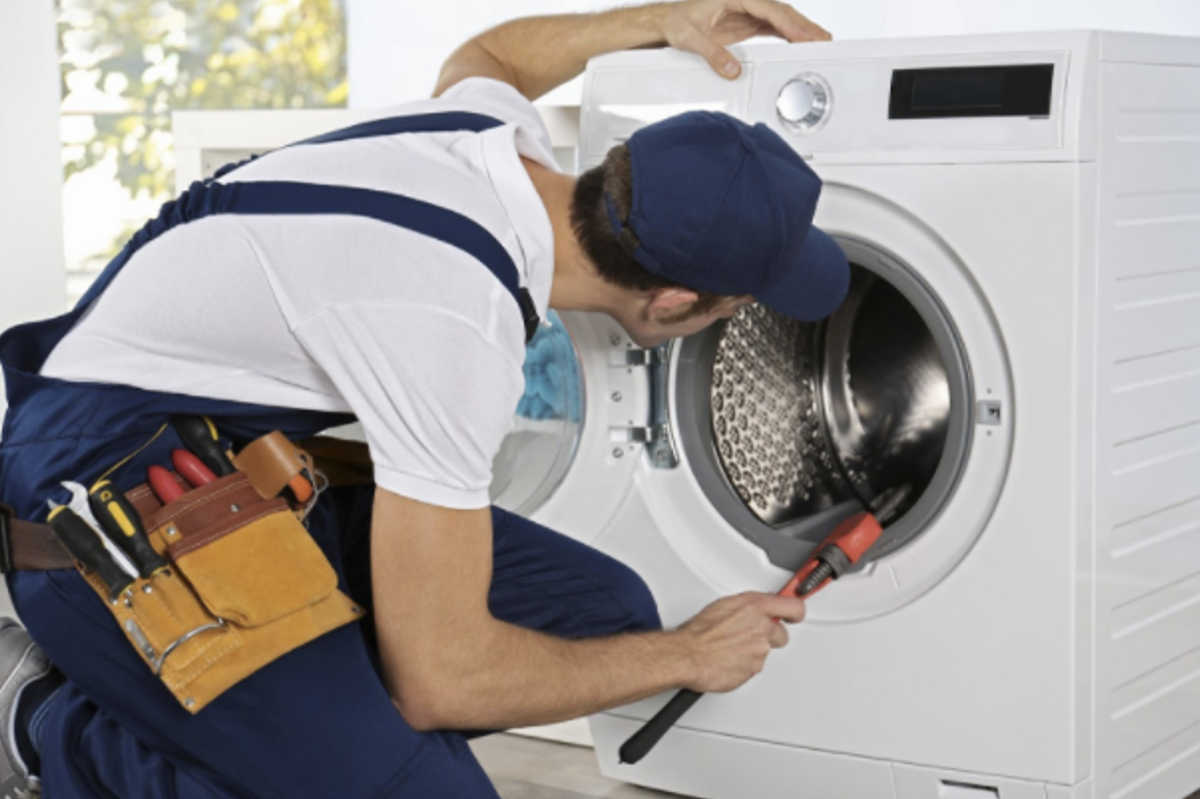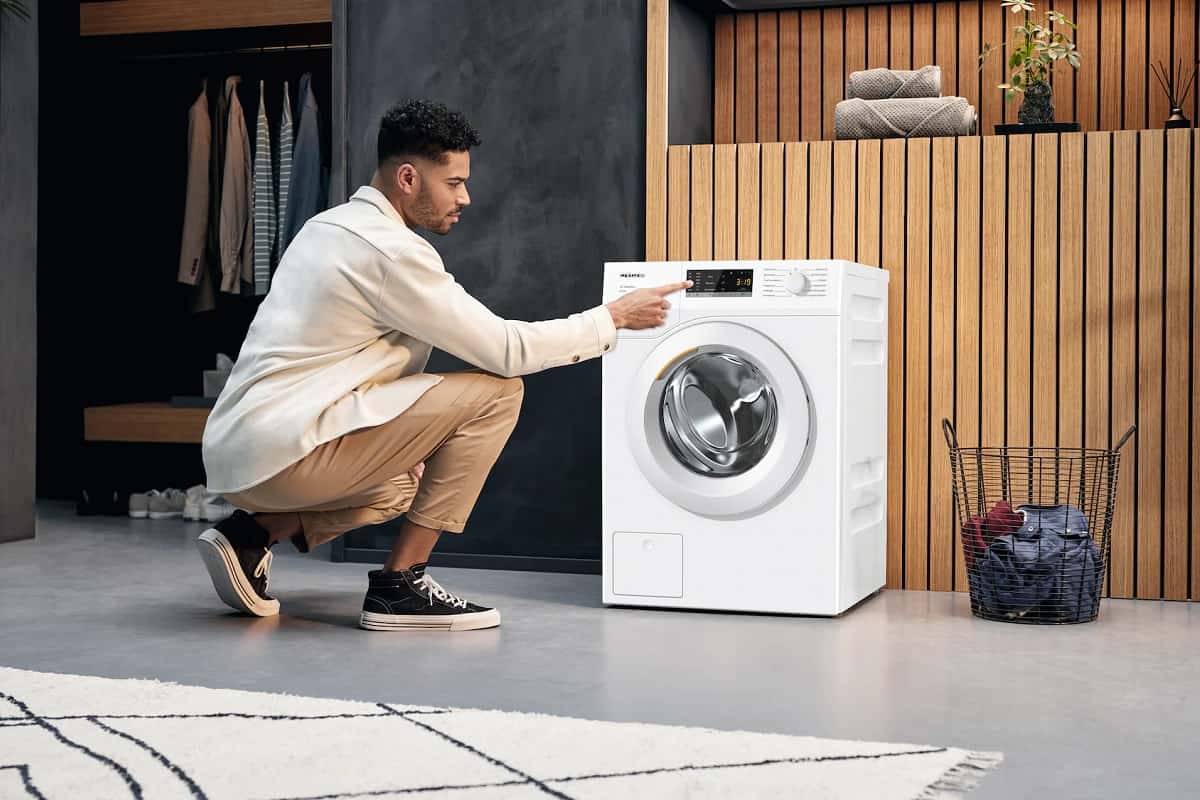
Common Causes of a Washing Machine Leaking from the Bottom
Washing machines can leak from the bottom for several reasons, ranging from simple fixes to more complex repairs. Here are the most common causes:
1. Damaged or Loose Hoses
The most common cause of washing machine leaks is damaged or loose hoses. If the inlet hoses or drain hose become cracked, worn out, or disconnected, water can escape and pool beneath your machine. It’s important to check the hoses at the back of the machine regularly for signs of wear and tear.
2. Faulty Water Pump
The water pump in your washing machine is responsible for draining water from the drum during the wash cycle. If the pump is damaged or has loose connections, it can cause water to leak from the bottom of the machine. A faulty water pump may also make strange noises during the spin cycle.
3. Clogged or Leaking Drain
If the washing machine’s drain is clogged or leaking, it can cause water to back up and spill out from the bottom of the machine. A clogged drain can be caused by lint, dirt, or even small clothing items that get stuck in the system, preventing water from draining properly.
4. Broken Door Seal (Front-Loading Machines)
For front-loading washing machines, the door seal (also known as the gasket) plays a key role in keeping water inside the drum during the wash. If the seal becomes damaged, worn, or loose, water can leak out from the door and pool beneath the machine. This is a common issue with older front-loading washers.
5. Cracked Tub or Drum
In more severe cases, a washing machine leak may be due to a cracked drum or tub. Over time, wear and tear can cause small cracks to form in the inner tub, allowing water to seep out during the wash cycle. Unfortunately, this is a more complex issue that typically requires professional repair or replacement of the tub.
For more tips on identifying washing machine leaks, check out this This Old House guide to fixing washing machine leaks.
How to Fix a Washing Machine Leaking from the Bottom

The steps to fix a leaking washing machine depend on the source of the problem. Here’s a step-by-step guide to troubleshooting and fixing the most common causes of washing machine leaks:
| Step | What to Do |
|---|---|
| 1. Turn Off the Water Supply | Before you begin any repairs, turn off the water supply to your washing machine to prevent further leaks. Locate the water shutoff valves behind the machine and turn them off by twisting them clockwise. |
| 2. Inspect the Hoses | Check the inlet hoses (connected to your home’s water supply) and the drain hose for any signs of cracks, holes, or loose connections. Tighten any loose hose connections with pliers or replace damaged hoses with new ones from a hardware store. |
| 3. Check the Water Pump | If the leak seems to be coming from the bottom of the machine, inspect the water pump. The water pump is typically located at the base of the washing machine. Look for any signs of cracks, leaks, or loose connections. If the pump is damaged, you may need to replace it. |
| 4. Clean or Unclog the Drain | If the washing machine isn’t draining properly, check the drain for clogs. Disconnect the drain hose and remove any debris, lint, or objects that may be blocking the flow of water. Reconnect the drain hose and ensure it’s securely fastened. |
| 5. Inspect the Door Seal | If you have a front-loading washing machine, inspect the door seal for any tears, cracks, or signs of wear. If the seal is damaged, it may need to be replaced. Clean the door seal regularly to prevent mold, mildew, and buildup that can affect the seal’s performance. |
| 6. Call a Professional for a Cracked Tub | If the inner tub or drum is cracked, it’s best to call a professional repair service. A cracked tub often requires replacement, which can be a complex and costly repair that’s difficult to handle on your own. |
If the leak persists after following these steps, it may be time to contact a professional plumber or appliance repair service. For expert help, Citywide Mold Mitigation offers water damage repair services to protect your home from further damage.
How to Prevent Future Washing Machine Leaks
Preventing future leaks is all about regular maintenance and care for your washing machine. Here are some tips to keep your washer in good working order and avoid future leaks:
1. Check Hoses Regularly
Inspect your washing machine’s hoses at least once a year for signs of wear, cracks, or leaks. Replace hoses every 5-7 years, or sooner if they show signs of damage. Investing in high-quality, stainless steel hoses can help prevent leaks caused by hose failure.
2. Don’t Overload the Machine
Overloading your washing machine can cause strain on the drum, motor, and other components, potentially leading to leaks. Follow the manufacturer’s instructions for load capacity to prevent damage to the machine.
3. Clean the Drain Filter
Many washing machines have a drain filter designed to catch lint, dirt, and small items before they enter the drain system. Regularly clean the drain filter to prevent clogs and reduce the risk of leaks. Refer to your machine’s user manual for instructions on cleaning the filter.
4. Replace the Door Seal (Front-Loading Machines)
If you have a front-loading washing machine, replace the door seal every few years, or as soon as you notice signs of wear. Keeping the seal in good condition will help prevent water from leaking during the wash cycle.
5. Use the Right Detergent
Make sure to use the appropriate detergent for your washing machine, especially if it’s a high-efficiency (HE) model. Using too much detergent or the wrong type can cause soap buildup, leading to clogs and leaks.
For more washing machine maintenance tips, check out this Family Handyman guide to preventing washing machine leaks.
When to Call a Professional

While some washing machine leaks can be fixed with DIY solutions, there are situations where professional help is needed. If the leak is due to a cracked tub, a damaged water pump, or a complex drainage issue, it’s best to call a plumber or appliance repair technician to prevent further damage to your machine and home.
If your washing machine has caused water damage or if you suspect mold growth, Citywide Mold Mitigation provides expert water damage restoration and mold removal services to protect your home and ensure a safe environment.
FAQ
| Question | Answer |
|---|---|
| Why is my washing machine leaking from the bottom? | Common causes include damaged hoses, a faulty water pump, clogged drains, a broken door seal (for front-loading machines), or a cracked drum. Identifying the source is key to fixing the leak. |
| Can I use my washing machine if it’s leaking? | No, it’s best to stop using the washing machine until the leak has been fixed. Continuing to use it can cause further damage to the machine and increase the risk of water damage to your home. |
| How do I prevent my washing machine from leaking? | Regularly check hoses for wear, clean the drain filter, replace the door seal if needed, avoid overloading the machine, and use the correct detergent to prevent leaks and keep your machine in good condition. |
| How often should I replace washing machine hoses? | It’s recommended to replace washing machine hoses every 5-7 years, or sooner if they show signs of damage. Opt for stainless steel hoses for extra durability. |
| When should I call a professional for a washing machine leak? | If the leak persists after basic troubleshooting, or if it’s caused by a cracked tub or damaged water pump, it’s best to call a plumber or appliance repair technician for assistance. |
If your washing machine has caused water damage or you need expert help with mold prevention, contact Citywide Mold Mitigation today for professional services.

